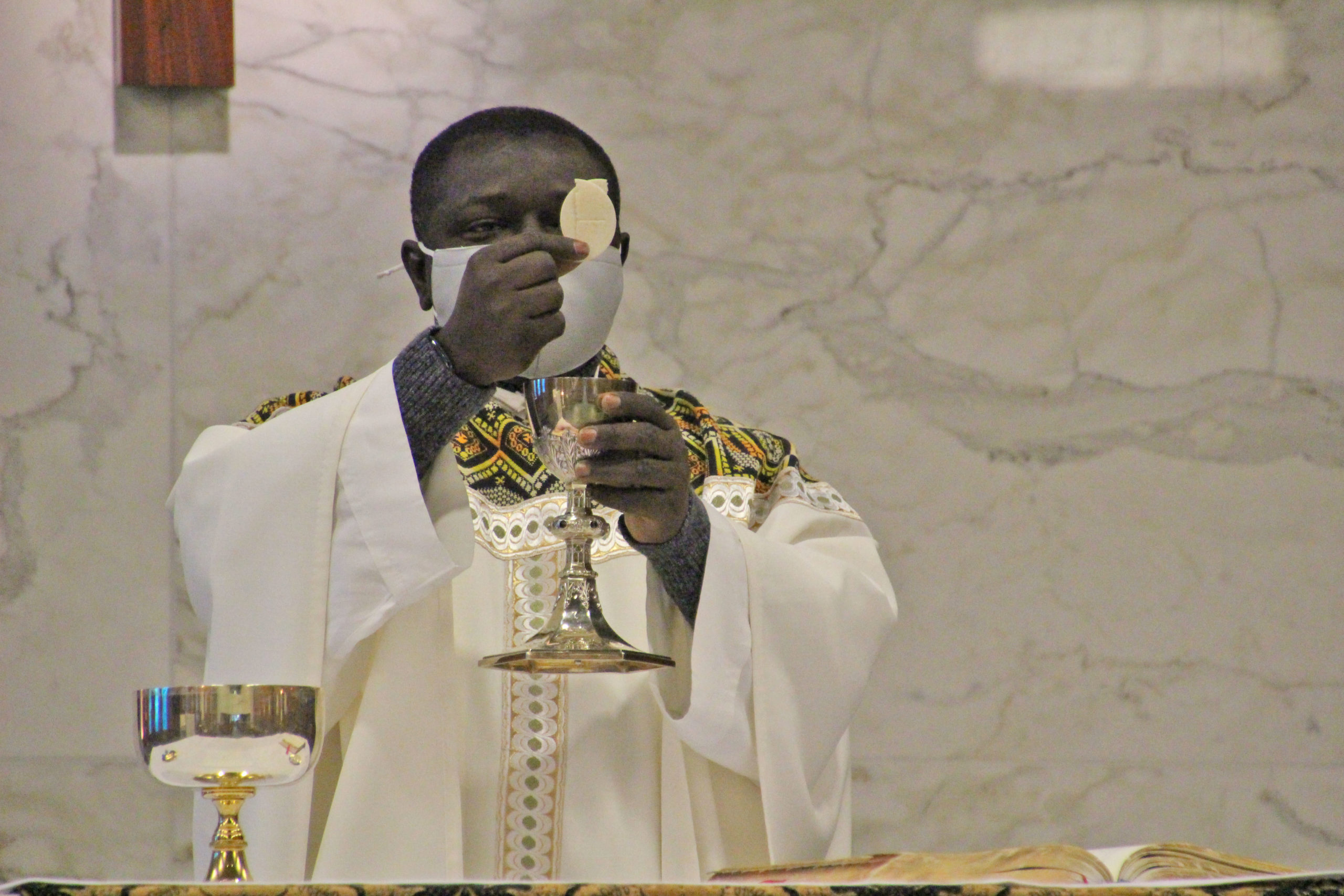
Father Michael Gadache, associate pastor of St. Pius X Parish in Omaha, offers the holy sacrifice of the Mass last fall. Since then, parishes have seen more people returning to Sunday Mass. On Pentecost, Archbishop George J. Lucas’ dispensation from the obligation of attending Mass on Sundays and holy days will be lifted. Catholics in the archdiocese will once again be required to participate at Mass on those days, with some exceptions. SUSAN SZALEWSKI/STAFF
News
God’s grace and mercy extended to the dead through offering of Masses
November 4, 2020
“We have loved them during life; let us not abandon them in death, until we have conducted them by our prayers into the house of the Lord.” – St. Ambrose
Catholics regularly pray for people who have died.
But in November, the Church gives special focus to the ancient practice, which includes having Masses offered for the dead.
The significance of the Mass offering is hard to overstate.
“The celebration of Holy Mass is as valuable as the death of Jesus on the cross,” St. Thomas Aquinas said.
Father Scott Hastings, Archbishop George J. Lucas’ vicar for clergy and judicial vicar, and Father James R. de Anda, a judge of the Metropolitan Tribunal for the archdiocese, would concur.
“What better can we do than offer Masses for people?” said Father Hastings. “It’s one of the tangible things we can do to assist people who go before us.”
In offering a Mass, the priest and congregation invoke God’s grace and mercy for a soul, and the graces from the Mass are applied to the deceased, Father de Anda said.
“When we’re praying for the deceased at Mass, we’re combining the two greatest commandments,” he said, to love God and neighbor.
The Catechism of the Catholic Church teaches: “From the beginning the Church has honored the memory of the dead and offered prayers in suffrage for them, above all the Eucharistic Sacrifice, so that, thus purified, they may attain the beatific vision of God” (no. 1032).
Offering Masses for the dead is, of course, based on the Church’s belief in purgatory.
“All who die in God’s grace and friendship, but still imperfectly purified, are indeed assured of their eternal salvation; but after death they undergo purification, so as to achieve the holiness necessary to enter the joy of heaven,” says the Catechism (no. 1030).
The notion of purgatory and offering prayers and Masses for the dead can be found in Scripture.
In the Old Testament Book of Maccabees, Judas Maccabeus offered prayers and sacrifices for the Jewish soldiers who had died wearing pagan amulets, which were forbidden by Jewish law.
Jesus alludes to purgatory in a parable in the Gospel of Matthew: “Make friends quickly with your accuser, while you are going with him to court, lest your accuser hand you over to the judge, and the judge to the guard, and you be put in prison; truly I say to you, you will never get out till you have paid the last penny” (5:25-26).
The Book of Revelation says of heaven that “nothing unclean will enter it” (21:27).
St. Paul urges Christians to pray without ceasing, and that includes praying for the souls of the departed, Father de Anda said. “We need to pray for our deceased relatives and friends often,” he said, as well as for those who are living.
“Prayers for the poor souls are invaluable – and they will remember that,” never forgetting those who prayed for them, he said.
Masses offered for people who have died help the living as well. The offering of Masses “are a manifestation of our hope in the love and mercy of God, and we’re drawn into the graces and blessings,” Father de Anda said.
“We who intercede also receive God’s grace,” he said. Scripture tells of people who approached Jesus to intercede for others, “and the Lord’s graces transformed the grief of those individuals – and their lives were transformed as well.”
Offering Masses for loved ones helps support the survivors as they grieve and perhaps helps them find closure for words left unsaid, Father Hastings said. “You can come to the church and pray for that person a little bit.”
It’s customary to give an offering when requesting a Mass for an intention. In the Archdiocese of Omaha, that amount is typically $10. More or less could be offered, depending on one’s financial situation.
Masses typically are requested through parish offices, and can be done by email, phone or mail.